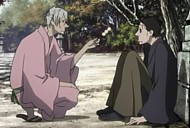
House Of Five Leaves
When I think of samurai, I think of mighty warriors with blades that could cut through steel as if it were oatmeal. I think of honor and duty and bad guys getting put through a human Cuisinart. I think of imperial castles and impossible betrayals and everything cool Star Wars stole from Japan.
So color me surprised to find a show about a samurai that is absolutely nothing like that, but still fantastic.
House of Five Leaves is one of the most unique anime I've ever seen. Another entry from the now-famous noitaminA time slot on Fuji TV, this pushes the envelope in many ways...but not the ones you expect. These days, "envelope pushing" usually means a filmmaker is trying to shock an audience. But here, it's in the myriad ways this isn't like most anime you've seen. The players look like they've stepped out of an ancient Japanese silk screen. The plot is barely the point. What action there is comes quick and brutal. It is no samurai epic. It is humanity in a long-ago time and place. And it is excellent.
Masa is a ronin. Without a lord and unable to return home, he wants to find work so he can send some funds back to his family. The problem is, Masa is perhaps the world's most timid samurai ever. Sure, he's skilled with a blade -- better than many, in fact -- but he's as apt to run from a fight as to draw his sword. That kind of attitude doesn't bode well for bodyguard work...
To his own surprise, a charismatic young man named Yaichi takes him under his wing. Soon, Masa learns why. Yaichi is the head of a tiny gang of kidnappers called the Five Leaves. They're very careful; they research their targets to make sure that the families are extraordinarily wealthy, yet corrupt enough not to want the police involved and concerned enough not to try to get their kidnapped heirs back by force. It's really all a bluff; none of them has the killer's heart to take out their kidnapees, but their families don't know that. Masa isn't sure what to make of this; all he knows is that he's desperately hungry. He agrees to help almost by default rather than by choice. He wants to be a stand-up guy, but he's not quite sure how.
This group of criminals isn't what you'd expect, either. The restaurant owner who hosts the Five Leaves' meetings wants to go legit. Their stealthy burglar is trying to pay off old debts. There's no sense of urgency and no real desire from any of them to be a part of the underworld. Each one has a past they'd like to forget. They're just trying to survive in Edo, where brothels thrive and selling yourself in one way or another is the only way to make a living. There's a fragile but growing friendship between the five, but things get complicated when a friendly samurai who works for the police takes a shine to Masa, and it puts the camaraderie of these "chivalrous bandits" to the test.
For the average viewer, House of Five Leaves may be a test of your anime flexibility. While the background art is pretty standard, the character art is strange, even ugly. Many of our anti-heroes have what I can only describe as "Gollum eyes." (That's particularly true if you're familiar with Gollum as represented in the Rankin-Bass version of The Hobbit from the late '70s.) While they might seem a tad disturbing at first, it really makes you feel like you've stepped into another world, one depicted in art from the period the show covers. It's a bold move, and I like it. Strangely enough, the music doesn't always fit; the OP/ED songs are good but J-Pop, which is incongruous, and the hurdy-gurdy tunes that occasionally wander in aren't exactly period pieces either.
But the show really shines in its relationship-building. The Five Leaves aren't angels, but they aren't bad people either. By the time the show was done, I felt genuine compassion toward them. They were working hard to break bad ties of yore with a limited amount of success. There's no excusing their criminal actions, and yet they are unwilling to do that themselves. As one says, the whole "chivalry" idea is just a notion he had to make him feel better about the crimes he was committing. In a sense, I wanted to befriend these folks and help pull them out of their downward spiral. While the show at twelve episodes is simply too short to give us the details behind each of the major players, I couldn't help but want to know more about them. By the end, I was thoroughly pulled into this world and eager to find out more about the manga.
Those who are expecting lots of slicing and dicing should look elsewhere. There are some unseemly elements; Masa winds up as a bodyguard for a brothel, though he doesn't indulge, and not only are there a few kidnappings, there are a couple of bloody deaths that occur mostly off-screen, though the aftermath is in full view. However, while the subject matter is not for children, it's tame otherwise. It's a mature work for mature viewers without so-called "mature" content. Once again, it's great to see a show where the vast majority of the characters are over the age of 20.
If the show has a failing, it's that at times the artwork and directorial choices made the story harder to follow than it needed to be. Certain designs looked alike, which for a show without that many characters was a curious (and in my opinion, faulty) choice. Some of the flashbacks were left intentionally murky so as to keep us guessing, but others just weren't as clear as they should have been. Finally, the lone female of the group, Otake, is unfortunately underwritten. It is really only these issues, along with the too-short running time, that keep it from getting a perfect grade. It's that good.
One doesn't exactly expect a slice-of-life drama with samurai from Edo, but House of Five Leaves gets it just about perfect. It's a life I certainly knew little about, and I'm thankful to have found it through this band of ruffians trying to carve out an existence in their little corner of history. As another solid collection from NIS America -- this time, even the box has texture like a painting -- it's a can't miss.
House Of Five Leaves -- mature subject matter, brief graphic off-screen violence -- A

